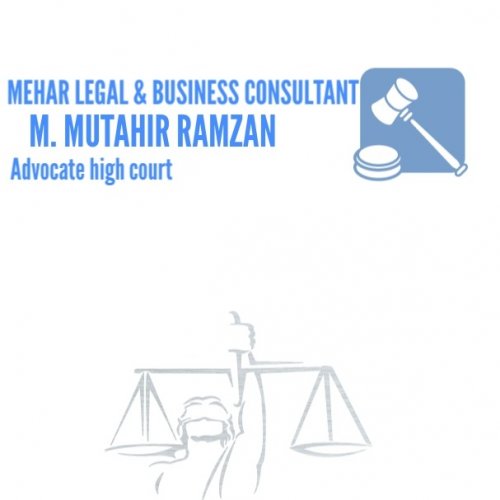Best Landlord & Tenant Lawyers in Gujranwala
Share your needs with us, get contacted by law firms.
Free. Takes 2 min.
Free Guide to Hiring a Real Estate Lawyer
List of the best lawyers in Gujranwala, Pakistan
About Landlord & Tenant Law in Gujranwala, Pakistan
In Gujranwala, Pakistan, the relationship between landlords and tenants is governed by the Punjab Rented Premises Act, 2009, along with provisions from the Contract Act, 1872. The legislation outlines rights and obligations of both the landlords and tenants, covering elements like rent agreement, eviction, rising rent issues, and maintenance of leased properties. Understanding these laws can help prevent disputes and promote a healthier relationship between the property owner and the occupier.
Why You May Need a Lawyer
Legal help might be essential in cases of eviction, rent rise disputes, damages to property, non-payment of rent, or when the Lease Agreement is breached. Lawyers can provide guidance on how to navigate these issues, whether you're a landlord seeking to evict a non-paying tenant, or a tenant dealing with unfair eviction or rent increment. A lawyer can also assist in drafting a Lease Agreement to ensure all provisions are legal and protect your rights.
Local Laws Overview
The principal laws that govern Landlord & Tenant relationships in Gujranwala, Pakistan, are the Punjab Rented Premises Act, 2009 and the Contract Act, 1872. The Punjab Rented Premises Act, outlines the lawful ways of increasing the rent and eviction of the tenants. As per this Act, a landlord can only evict a tenant under specific circumstances such as non-payment of rent. In addition, it also provides a mechanism for resolving disputes through Rent Tribunals.
Frequently Asked Questions
What is the process of eviction in Gujranwala?
Under the Punjab Rented Premises Act, a landlord must serve an eviction notice to the tenant. If the tenant does not comply, the landlord can approach the Rent Tribunal for an eviction order. It is illegal to force the tenant out of the property using unlawful means.
Can a landlord increase the rent arbitrarily?
No, according to the Punjab Rented Premises Act, the landlord can increase the rent per year by 10% of the existing rent, given that this provision is explicitly stated in the Lease Agreement.
As a tenant, do I have the right to privacy?
Yes, a tenant has the right to privacy. A landlord cannot enter the leased premises without giving the tenant 24-hour advance notice and obtaining their consent unless there is an emergency.
Can a lease agreement be oral?
Yes, oral agreements are valid but written lease agreements are recommended as they provide a written record of terms agreed upon by both parties.
What happens if a tenant doesn't pay rent?
Upon continuous non-payment of rent, the landlord may evict the tenant by serving an eviction notice. If the issue is not resolved, the landlord can approach the Rent Tribunal for obtaining an eviction order.
Additional Resources
For more detailed legal information related to Landlord & Tenant laws in Gujranwala, you may check the official Pakistan Law Site and Punjab Laws Online.
Next Steps
If you find yourself in need of legal assistance regarding Landlord & Tenant disputes or matters, it's highly recommended to contact a lawyer specializing in this specific field. Various legal firms in Gujranwala offer free initial consultations, utilize such services to identify the best course of action tailored to your specific situation.
Lawzana helps you find the best lawyers and law firms in Gujranwala through a curated and pre-screened list of qualified legal professionals. Our platform offers rankings and detailed profiles of attorneys and law firms, allowing you to compare based on practice areas, including Landlord & Tenant, experience, and client feedback.
Each profile includes a description of the firm's areas of practice, client reviews, team members and partners, year of establishment, spoken languages, office locations, contact information, social media presence, and any published articles or resources. Most firms on our platform speak English and are experienced in both local and international legal matters.
Get a quote from top-rated law firms in Gujranwala, Pakistan — quickly, securely, and without unnecessary hassle.
Disclaimer:
The information provided on this page is for general informational purposes only and does not constitute legal advice. While we strive to ensure the accuracy and relevance of the content, legal information may change over time, and interpretations of the law can vary. You should always consult with a qualified legal professional for advice specific to your situation.
We disclaim all liability for actions taken or not taken based on the content of this page. If you believe any information is incorrect or outdated, please contact us, and we will review and update it where appropriate.










